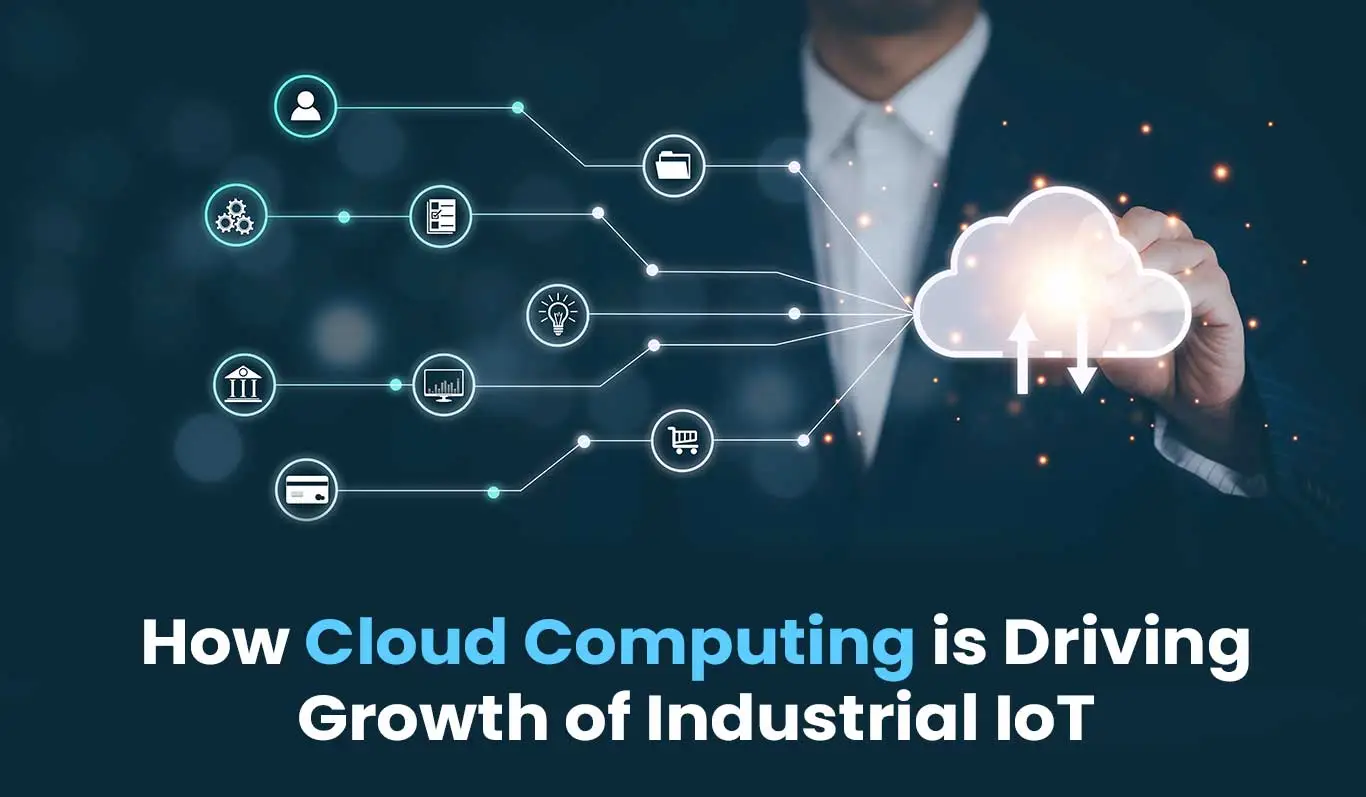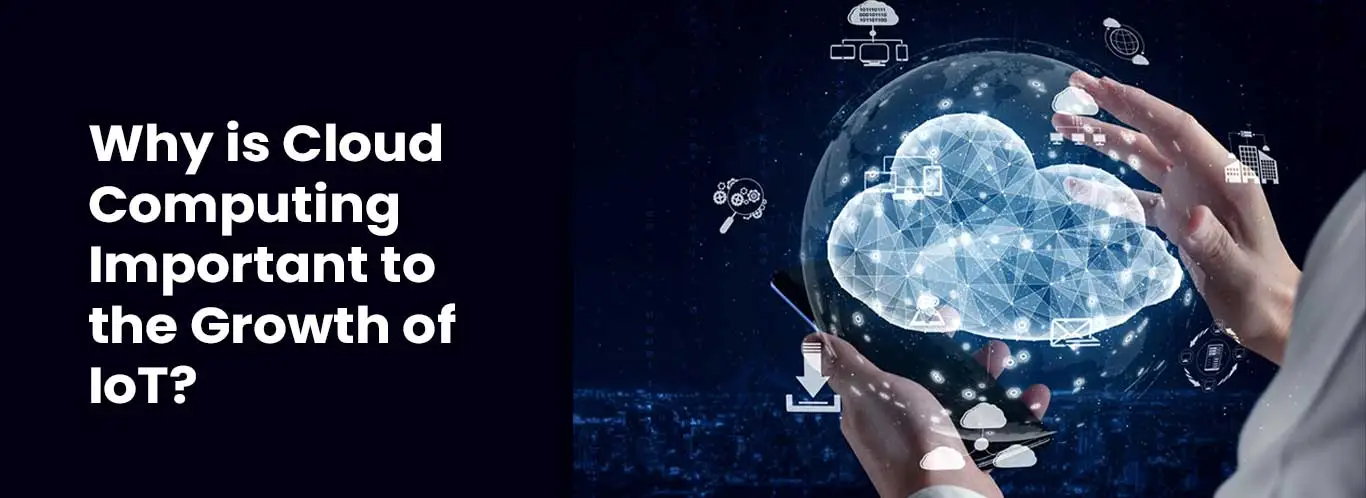How cloud computing is driving growth of industrial IoT

Introduction
Innovation and growth are driven by collaboration between various technologies in the 21st century. The Internet of Things (IoT) and cloud computing are two of these technologies.
Data generated by IoT systems needs to be stored and processed securely and efficiently. Cloud computing provides a platform for storing, processing, and managing the IoT data.
The purpose of this blog is to explore the role of cloud computing in driving the growth of the Industrial Internet of Things (IIoT). Check out the various cloud computing platforms and models available for IoT system deployments, and how businesses can make the right choice.
IoT and Cloud Computing

By utilizing IoT based cloud services, businesses can access computing resources, data storage, software, and other resources on-demand without purchasing hardware. By enabling everyone to access enormous resources, it has improved productivity, data security, and growth.
With IoT, businesses can integrate smart technologies into their tools, providing advanced solutions for traffic management, pollution monitoring, agriculture, and healthcare. Combined with IoT, cloud computing creates opportunities for success.
Industrial Cloud Computing
What is industrial cloud computing? This is not just another cloud service, but an industrial solution created specifically for industries.
Through this vertical movement, more precise and customized solutions are provided for specific industries. The data gathered from industrial processes will be used to enhance operational productivity.
Industrial cloud computing plays a significant role in many business areas. One of these areas is where the Industrial Internet of Things (IIoT) are managed. Industrial IoT, as it is commonly known, is a network of industrial machines that connect to each other for communication, and the cloud is able to control industrial machines and manufacturing processes remotely. Using cloud computing, businesses can share industrial data securely between organizations, storing data in cloud storage for later processing.
Why is Cloud Computing Important to the Growth of IoT?

Remote Access: Cloud computing allows for devices and data to be managed and executed remotely.
5G connectivity is reducing the need for on-premises servers in more countries. With cloud-based systems, you can scale up or down as needed, and edge computing makes it easier to send data to the primary cloud. Cloud providers are integrating edge locations into their services, improving performance and reducing costs.
Secure: Cloud-based systems are often more secure than locally-based systems.
Cloud computing seamlessly integrates with the best authorization and authentication providers, enabling data to be stored on remote servers. Businesses can protect their data in motion and at rest with encryption.
The Internet of Things makes it possible for connected devices to communicate, enabling solutions never before possible. Cloud platforms are used to manage and execute IoT devices remotely. In order to reduce congestion and improve road safety, self-driving cars can be connected to traffic lights and controlled remotely.
Data Sharing: The sharing of data from smart devices between different parties is a key part of the success of IoT.
Cloud platforms can be used to share data securely and accurately. A smartwatch, for instance, can share data with medical professionals, creating better healthcare solutions for everyone.
Robust: Cloud computing provides a resilient platform for businesses in an era where device connectivity is of prime importance.
To provide redundancy, IoT applications can be deployed across multiple regions, and data can be replicated throughout multiple regions. If there are any issues with devices or data, they can be resolved quickly and easily, without the need to rebuild the system from scratch.
Cloud Platforms for IoT System Deployments
Some of the top cloud platforms for IoT system deployments are:
-
Thingworx 8 IoT Platform
-
Microsoft Azure IoT Suite
-
Google Cloud’s IoT Platform
-
IBM Watson IoT Platform
-
AWS IoT Platform
-
Cisco IoT Cloud Connect
-
Salesforce IoT Cloud
-
Kaa IoT Platform
How to Choose the Right Cloud Computing Platform for Your IIoT System?
There are several cloud computing platforms available for IIoT system deployments. Platforms differ in their capabilities and features, making them suitable for different types of businesses.
The key factors involved are:
Scalability
You must be able to adapt the platform to your growing business needs. It is essential that your IIoT platform be scalable in order to handle the growing volume of data as your business grows.
Security
To protect sensitive data from cyber-attacks, the platform should have robust security features. Data privacy and security should be ensured by ensuring the platform complies with industry standards and regulations.
Flexibility
Different types of sensors and devices should be able to be integrated into the platform. For seamless integration, choose platforms that support multiple protocols and have open APIs.
Reliability
Platform uptime should be high and downtime should be minimal. Provide redundancy and failover mechanisms for the platform to prevent service interruptions.
Cost-effectiveness
Make sure the platform you choose gives you value for your money. The total cost of ownership over the platform's lifespan is comprised of upfront costs, ongoing maintenance and support fees, and the total cost of ownership over the platform's lifespan.
Examples of Businesses Using IIoT
Many businesses are using IIoT to improve their operations and increase efficiency. Here are some examples of businesses using IIoT:
-
Caterpillar (CAT) - American machinery and equipment firm
-
Magna Steyr - Austrian automotive manufacturer
-
John Deere - American corporation that manufactures agricultural, forestry, and construction machinery
-
Tesla - American automotive and Energy Company, specialized in the manufacturing of electric vehicles
-
Hortilux - Provides lighting solutions
Conclusion
IoT (Internet of Things) and cloud computing are complementary concepts, and when they are used together, they can drive the growth of the industrial IoT in parallel with each other. There are many cloud computing platforms that can be used to deploy IoT systems, and each platform has its own advantages as well as disadvantages, and businesses should choose the platform that is suitable for their unique needs based on their requirements. Combining cloud computing with IoT offers numerous opportunities for businesses to increase productivity, efficiency, and growth, making it a powerful economic tool.
Request a Quote
Categories
Popular posts
Best Practices for Software Product Engineering Every CTO Should Implement
2023-14-18How to Build Your Own On-Demand Carpooling App Services?
2023-08-25How to Start an On-Demand Fuel Delivery Business: A Comprehensive Guide
2023-07-28Empowering Miners: How Fleet Management Apps are Transforming the Mining Industry?
2023-07-21A Complete Guide to Develop a Food Delivery App for Restaurants in 2023
2023-07-08Mobile Apps Transforming the Travel Industry: A Game-Changer in Travel Planning and Experience
2023-07-07
